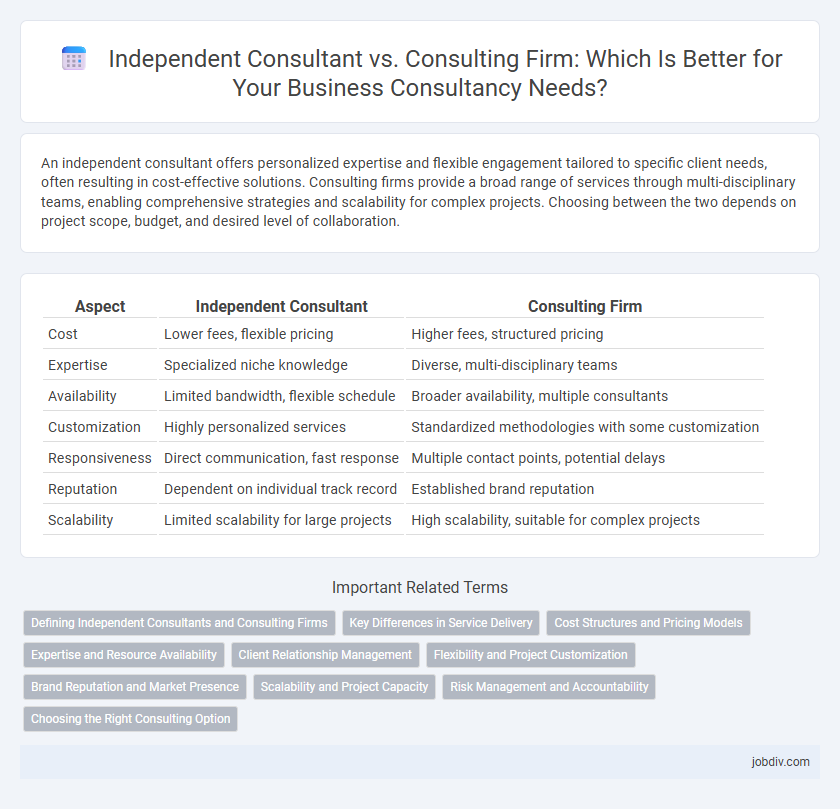An independent consultant offers personalized expertise and flexible engagement tailored to specific client needs, often resulting in cost-effective solutions. Consulting firms provide a broad range of services through multi-disciplinary teams, enabling comprehensive strategies and scalability for complex projects. Choosing between the two depends on project scope, budget, and desired level of collaboration.
Table of Comparison
| Aspect | Independent Consultant | Consulting Firm |
|---|---|---|
| Cost | Lower fees, flexible pricing | Higher fees, structured pricing |
| Expertise | Specialized niche knowledge | Diverse, multi-disciplinary teams |
| Availability | Limited bandwidth, flexible schedule | Broader availability, multiple consultants |
| Customization | Highly personalized services | Standardized methodologies with some customization |
| Responsiveness | Direct communication, fast response | Multiple contact points, potential delays |
| Reputation | Dependent on individual track record | Established brand reputation |
| Scalability | Limited scalability for large projects | High scalability, suitable for complex projects |
Defining Independent Consultants and Consulting Firms
Independent consultants operate as solo professionals offering specialized expertise directly to clients, enabling personalized service and flexible project management. Consulting firms consist of multiple consultants organized into teams, providing a wider range of services and resources tailored to complex, large-scale business challenges. The choice between an independent consultant and a consulting firm depends on project scope, budget, and the need for diverse skill sets.
Key Differences in Service Delivery
Independent consultants offer personalized, flexible service delivery by tailoring solutions to specific client needs, often providing direct access to the expert managing the project. Consulting firms deliver structured, scalable services with a broad range of specialized teams and resources, enabling them to handle large, complex projects efficiently. The choice between an independent consultant and a consulting firm typically depends on the project's scope, budget, and required expertise depth.
Cost Structures and Pricing Models
Independent consultants typically have lower overhead costs, allowing them to offer more flexible and often competitive pricing models such as hourly rates or fixed project fees. Consulting firms usually have higher operating expenses, reflected in tiered pricing structures, retainers, or value-based fees that cover a broader range of services and resources. Cost structures for independent consultants emphasize direct client engagement, while consulting firms allocate fees to cover specialized teams, administrative support, and comprehensive solutions.
Expertise and Resource Availability
Independent consultants offer specialized expertise with deep knowledge in niche areas, providing personalized and flexible solutions tailored to specific client needs. Consulting firms bring diverse teams with broad industry experience, enabling access to a wide range of resources and multidisciplinary insights for complex, large-scale projects. Resource availability in firms generally ensures faster scalability and comprehensive support, while independent consultants excel in agility and customized attention.
Client Relationship Management
Independent consultants offer personalized client relationship management, fostering direct communication and tailored solutions that enhance trust and agility. Consulting firms provide structured client management systems and diverse expertise from multiple consultants, ensuring comprehensive support and scalability for complex projects. Effective client relationship management in both models hinges on responsiveness, clear communication, and customized value delivery.
Flexibility and Project Customization
Independent consultants offer greater flexibility in adapting schedules and project approaches to client-specific needs, allowing for highly customized solutions. Consulting firms provide broader resource availability and diverse expertise but often follow standardized processes that may limit personalization. Clients seeking tailored, agile responses frequently prefer independent consultants for their ability to swiftly pivot and customize deliverables.
Brand Reputation and Market Presence
Independent consultants build brand reputation through personalized expertise and direct client relationships, often resulting in high trust and niche market influence. Consulting firms leverage collective resources, established methodologies, and broader market presence to deliver scalable solutions and higher visibility across diverse industries. The choice between independent consultants and firms depends on client priorities for specialized knowledge or comprehensive service offerings within competitive landscapes.
Scalability and Project Capacity
Independent consultants offer personalized expertise with flexible project scopes but face limitations in scalability and capacity during high-demand periods. Consulting firms provide larger teams and diverse skill sets, enabling them to manage multiple complex projects simultaneously and scale resources efficiently. Clients requiring extensive, multifaceted solutions often benefit from the comprehensive capabilities and robust infrastructure of consulting firms.
Risk Management and Accountability
Independent consultants offer personalized risk management strategies with direct accountability, enabling swift decision-making and tailored solutions for clients. Consulting firms provide comprehensive risk management frameworks supported by multidisciplinary teams, distributing accountability across specialists and ensuring rigorous oversight. Choosing between them depends on the organization's need for customized focus versus broad expertise and shared responsibility in risk mitigation.
Choosing the Right Consulting Option
Selecting between an independent consultant and a consulting firm depends on project scale, budget constraints, and desired expertise. Independent consultants offer personalized insights and often lower costs, ideal for niche challenges or smaller projects. Consulting firms provide broader resources, diverse skill sets, and scalability for complex, large-scale initiatives requiring multidisciplinary approaches.
Independent Consultant vs Consulting Firm Infographic

 jobdiv.com
jobdiv.com